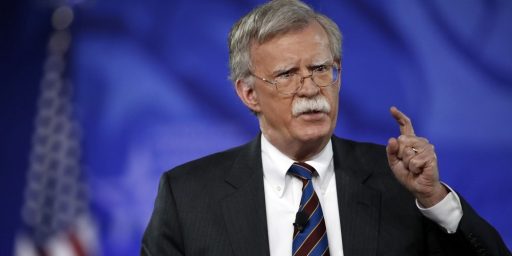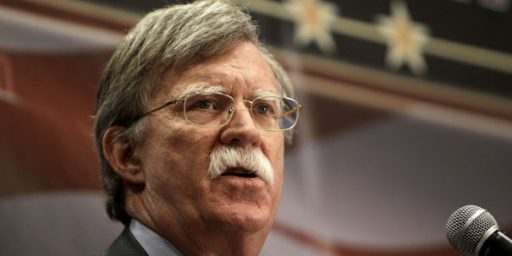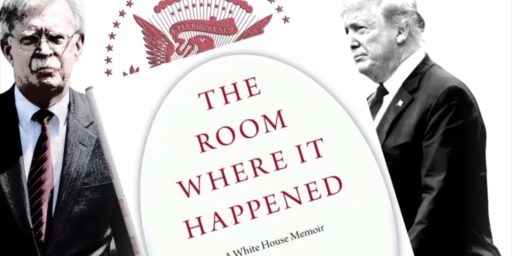Bush Surrendering Presidential Prerogative?
Ed Morrissey is quite dismayed by the shake-up in the Bush foreign policy team marked by the ouster of Donald Rumsfeld, resignation of John Bolton, and now the transfer of Iraq envoy Zalmay Khalilizad. Given that Democrats and a handful of RINOs wanted to see a shakeup, this looks to Ed suspiciously like Bush giving up the fight.
Pardon me, but the presidency carries with it certain prerogatives, among them the power to determine the foreign policy of the United States. In fact, it’s one of the chief responsibilities of the office, and normally Presidents are given the leeway to determine the people best suited to carry it out. The treatment of John Bolton was unprecedented — the rejection of a political appointment in the foreign service not because of any disqualifying event, but because the Senate didn’t like the policy of the administration.
It’s a serious breach of the separation between the branches of government. Congress does not dictate foreign policy nor should they veto ambassadorships unless the nominee has no qualifications to the position. Bolton has years of service in foreign policy, and has demonstrated his ability to conduct the affairs of the US at the United Nations for the last year. It sets an awful precedent: Congress just invalidated the 2004 Presidential election that put foreign policy in Bush’s hands.
Both as a general principle and in the case of Bolton specifically, I believe presidents deserve to have their appointees receive an up-or-down vote in the Senate. While the filibuster and other obstructionist techniques have a long history, they are extra-constitutional and should be reserved for only the most fundamental policy disputes.
Still, the idea that the Constitution gives the president carte blanche on matters of foreign policy is simply wrong. The Constitution provides for some major checks and balances in both foreign and military affairs. The president is commander in chief of the armed forces but Congress declares war and raises the army and navy. The president negotiates treaties but they only go into effect if they are ratified by two thirds of the Senate. The president appoints ambassadors but they must be confirmed by the Senate.
By the nature of executive power’s consolidation into a single individual, the president has a natural advantage. The president can set events into motion by, say, ordering the military to deploy and use force and, as a practical matter, it is then very difficult for Congress to cut off funds and force him to bring them home. Through abuse of the recess appointment power (which was intended for an era when Congress was in session for only short periods, not the full time body it has become since the advent of air conditioning), as happened in Bolton’s case, or the negotiation of executive agreements, presidents can in effect bypass much of Congress’ authority. (For a more detailed discussion, see my TCS article “Real Power Is Something You Take.”)
Let’s not confuse reality with design, however. The Framers clearly intended for foreign policy to be “an invitation to struggle” between the Executive and Legislature. In recent decades, the president has been winning that struggle, with only minor corrections in the other direction when Congress gets its dander up over what it perceives as executive abuse.
As to whether Bush is giving up the fight here, I see no evidence of that. He has already signaled that he has no intention of major changes in direction in Iraq, Baker Commission or Congress be damned.
Still, the war has clearly not gone well, has dragged on much longer than he would have liked, and has been an anchor around his neck, draining his political capital and making it impossible to achieve any of his other policy goals. He was re-elected despite the war in 2004 and lost both Houses of Congress weeks ago largely because of it. Perhaps recognition of these facts and some course corrections as a result of that is a good thing?
UPDATE: Steven Taylor notes, too, that “policy is not people, it is ideas. While a given person may be more efficacious at executing a given policy than someone else, the real issue is whether there are good ideas being deployed.”






Is it possible Bush is feeling betrayed and is trying now to regain his bearings?? Just a question for which I have no answer. My only hints are that we see less of Cheney. Then there is the recently leaked Rumsfeld memo. Rumsfeld had been painted as unyielding and hard-headed by many during the course of the war. I assumed the President was getting the same type of feedback from Rummy in private. Then just after Rummy leaves, out comes this memo that suggests he was open to re-evaluating the logistics of the Iraqi situation. Was the President himself ever aware of these epiphanies?? Why all of this re-evaluation just prior to his departure. Like I said, I just don’t know. Frankly, one of the feelings that I have had about Bush is that he does very well when he can assert his policy without much blowback. In contrast and as an example, when he made a move to reform social security, he seemed to lose interest quite rapidly when he would have had to confront the hardball political tactics of the Democrats who wished to maintain the status quo. Of course he had a relatively impotent Republicann leadership advocating for him. But maybe he alienated them also. Well, I think I’m rambling now so I’ll stop.
I think this is bad news for the president for another reason you haven’t mentioned, James. Several of those leaving (Rumsfeld, Bolton) are lightning rods—the idea is that they’ll deflect criticism away from the president. Gates is certainly not in that mold. Criticism that isn’t targeted at Gates or whoever replaces Bolton and Khalilzad will be targeted more squarely at Bush himself.
See less of Cheney? As the remaining lightning rod I think we’ll see more of him if anything.
Of course, another situation could be that although the Dems want to rule Congress with a feeling of bipartisanship, they would also be quite obstructionist to most of Bush’s pet policy initiatives – except maybe immigration. So maybe he figures to lay low and force the Democratic Congress to initiate legislation for two years and let the country see outright what the long term future will potentially be with them controlling Congress and posssibly the White House in 2008.
While the filibuster and other obstructionist techniques have a long history, they are extra-constitutional
What makes you say that?
Ugh: The fact that they are not in the Constitution.
One of the hallmarks of the Bush Presidency – in fact, of his entire life – is a strong desire for the trappings of success combined with a deep aversion to hard work. He loves to make decisions & delegate things, but he never follows up on those decisions, or the people he delegates to – once he’s done his “decider” thing, it’s off his plate, and he has shown an extremely caustic, even vindictive attitude to anyone who calls him on lack of follow-through.
I believe that, now that Congress will no longer roll over & play dead for anything he says, Bush will decide that fighting to keep the Executive Privilege gains he’s made will become “too tough”. Cap’n Ed is right – Bush is giving up the fight, because it’s no longer “fun” to be in charge. I predict you will see a vaccilation in the coming months, between Bush’s natural tendency to bail on things he’s lost interest in and the pressures of people like Rove & Cheney to maintain what they’ve gained & even forge ahead. Look for lots more fissures in the public face of the WH soon…
James,
They may not be in the Constitution, but they have long been accepted by both parties as valid tools of Congress. For the right to complain about filibusters & obstructionism is one thing, but wait and see how long it takes them to adopt those same tactics. I don’t count you in this crowd, but I’d like to call a “hypocrisy watch” on all the most vocal Congressional defenders of the “straight up-or-down vote” meme now that the GOP no longer has the majority – let’s see how long it takes someone like McConnell to void that argument…
Ugh: The fact that they are not in the Constitution.
But the Constitution also does not say how the Senate is to give its advice and consent, it does provide that “Each House may determine the Rules of its Proceedings.” Wouldn’t you look to the rules of the senate’s proceedings to see whether it has given its advice and consent? The filibuster is no more extra-constitutional than the President ordering the troops into battle.
legion: I think the filibuster is “extra-Constitutional” rather than unconstitutional. It’s a legitimate tool of the minority but, because it’s extra-Constitutional, one that should be used very sparingly. It has become much too routine in recent years on both sides of the aisle.
I think the Jesse Helms and company obstruction of Clinton’s appointees was just as egregious; I just didn’t have a blog then.
Or to make my point a little differently, the filibuster is no more extra-constitutional than an up-or-down vote.
I would agree that it should be used sparingly.
I would also note that if you’re using extra-constitutional to mean “not specifically provided for in the constitution” rather than as a label for something that is illegitimate (or less legitimate than something else), then I don’t object.
Ugh, James,
Agreed on all points. Kumbayah!
But assuming we’re correct here, what’s the next item of interest that will support or shoot out these positions? Is it likely Bush will get involved with the last legislative gasps of this Congress? Drop a new list of nominees? Or will he hit the bunker until after the holidays & let Cheney, et al, face front for awhile?
Legion- pinch yourself, you’re dreaming. When you awake from the post-election haze, consider the folowing: If the President personifies the attributes you have laid out for him, exactly what part of Iraq policy is he not following through on?
There are a few seperate issues here. First the changes to the team roster. Well, duh, people have been screaming about this for quite a while. When the President gives the fringe what they want (likely for many reasons that will not be entirely known in public), we see this skewed analysis about abandonment. You would think they might be happy, or appreciative, or something.
Then there’s Bolton. His lack of confirmation for no good reason a clear and disgraceful statement to the world that we are not united, that political bickering can cripple our effectiveness in foreign policy, and even in retaining our superpower status.
For the Democrats, I can only say that they know not what they do. They are showing the world we are spineless, that it only takes a little controversy to bring us to our knees. They are nurturing a culture of people in this country that think nothing is worth fighting for.
It seems the path the Dems have chosen is to compete with the UN for getting absolutely nothing positive accomplished. We may yet see that there is a value less than zero.
Bush and Cheney are both in the terrifying position that comes with the first stages of recovery from deep denial. Look forward to two years of bungling, back stabbing and vetoing of all the populist legislation coming out of Congress. Also, look for Republicans to peel off from the president on major issues in a vain attempt to save their political asses.
LJD,
You do realize, don’t you, that the Democrats don’t actually take power until January? That the lack of anything being accomplished by Congress is entirely GOP-driven? than Bolton’s failure to be confirmed could not have happened without the approval of significant GOP powers, who agreed on his unsuitability?
Also, it wasn’t some “fringe” demanding Rumsfeld’s ouster, it was a significant chunk of people on both sides of the aisle. As for follow-through, I think it’s fairly obvious – Bush declared a war & then stopped paying any attention at all to how it was being waged. He left it entirely in Rummy’s hands, and Rummy screwed it up royally by ordering his own planners not to plan for post-combat operations. That’s pretty well-documented by now. And in all the time since “Mission Accomplished”, Bush has not pushed his own people to actually finish the task he gave them to secure & stabilize Iraq. Nor have the companies given billions upon billions of taxpayer dollars been held accountable for accomplishing their jobs.
You haven’t been paying attention, have you? We’ve been fighting for our own country. Face it LJD – this isn’t some random group of wingnuts disagreeing with your philosophy & priorities, it’s the majority of the country. Now it’s yuor turn to deal with it.
Ugh: The problem is that the Constitution sets forth a handful of things for which there is to be a super-majority requirement (2/3 or 3/4, usually). The filibuster, especially when used for appointments, violates the spirit of that by making an effective 3/5 requirement for confirmation rather than a simple majority.
(Note: I wrote this a couple hours ago but forgot to post after previewing.)
Legion,
This crowd does not have any intention of paying attention to reality, i.e., that the Iraq debacle was initiated by a Republican President aided and abetted by a Republican-controlled Congress.
The party of “personal responsibility” has no intention of taking any responsibility for the abysmal failures of Republican policies over the past six years.
They are already blaming Democrats for all the ills that plague the earth, and the new Congress has not even been sworn in yet.
Expect more of the same for the next two years as they move into full CYA mode.
By the way, Gates just said that the U.S. is not winning in Iraq. I guess that makes him “unpatriotic”, a “Defeatocrat” and a “terrorist-appeaser”… Or are our little friends on the extreme right going to let this one slide since it was uttered by one of their own?
So, the democrats should have backbone enough to sit down, shut up, and do what they’re told? By putting up any kind of a fight, they are proving that they won’t put up a fight? My friend, you take Orwellian speak to a whole new level.
While we’re on the subject of double-speak:
When did the separation of powers come to mean that all powers should be vested in the executive without meaningful oversight?
Michael,
Indeed. In fact, in that very quote, Cap’n Ed seems to forget that Congress _does_ play a significant role in foreign policy. Not only do they fund foreign aid (as well as everything else the President asks for, but cannot demand), but a treaty ain’t a treaty until it’s signed by the Executive _and_ ratified by Congress.
Clearly, Ed & others are building a platform from which to criticise the incoming Congress for their Evils. As soon as they commit some.
Clearly, Ed & others are building a platform from which to criticise the incoming Congress for their Evils. As soon as they commit some.
Posted by: legion at December 5, 2006 13:27
And if the incoming Congress does not commit any Evil, they’ll invent some. And they’ll find a way to blame the incoming Congress for the Evils committed by the Departing Congress. This crowd does not have any qualms about rewriting history. Heck! They have made up their own reality. They live on Planet Bush.
And I do not mean by that they are insane. Some of them are certifiable crackpots, but the rest are authoritarians who long for a dictatorship. These people do not believe in democracy. They don’t want law and order. They just want order, and only as long as they are the ones who give the orders. Now they are sputtering with rage and frustration because the average American voter has shown his/her preference for democracy. Expect them to become shriller, more strident, and more vicious in the near future.
“Now they are sputtering with rage….” Devil’s/Advocate, clearly you were in a coma after the 2004 elections with respect to witnessing the post election behavior of the Democrats. I don’t think the Republican response comes anywhere near the anger the Dems demonstrated then.
Posted by: DaveD at December 5, 2006 15:07
Nice try, but no cigar. I notice that you carefully avoid dealing with the question of authoritarianism versus democracy.